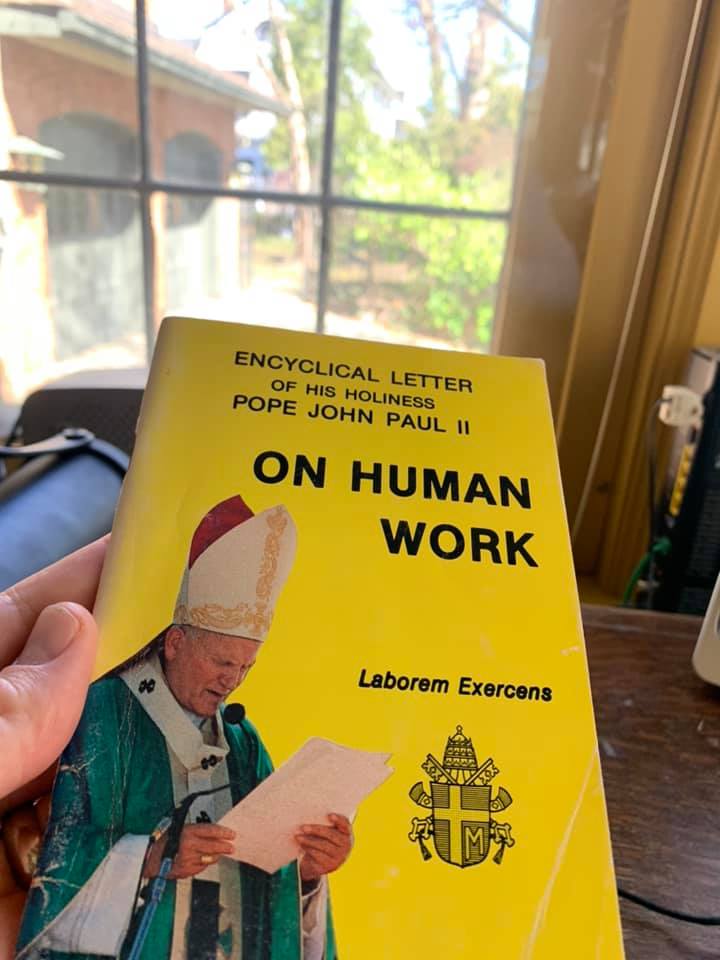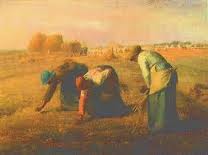“Work is a good thing for man – a good thing for his humanity – because through work man not only transforms nature, adapting it to his own needs, but he also achieves fulfillment as a human being and indeed, in a sense, becomes ‘more a human being’.”
Laborem Exercens (1981) St. John Paul II
The Pope focuses our attention on the the subjective experience of the worker, who bears the imago dei and thereby lends work its dignity. He raises some things we need to regularly recall. Today, too often, workers disconnect their experience from that of God’s image, and the life of the Church’s genuine experience of prayer, work, the moral life (one’s personal encounter with the Lord) and the community of faith. Their might be good reason for this fact. That is, too many of us are not doing anything meaningful in contributing to the common good; there is a lack of generatively, a failure to see work as working with God to advance His Kingdom on earth and looking forward to Paradise. Work is not vocation; work may be more akin to one’s mission but not a “calling.” Big difference. And I think we need to revolutionize work according to the mind of St. Benedict and the Benedictine tradition.
Having just returned from the annual Benedictine Oblate retreat I attend with men and women in the greater New York City area, where we conferenced on St. Benedict’s idea of accountability as a cor ad cor experience. Today, I am also thinking of, in general terms, what the Rule of Benedict and the gift of Benedictine monasticism gives us on the theme of work. Just as accountability is a heart-to-heart experience, so is work.
In the experience of the monastery –which needs to be translated in the life of those of us not professed monks and nuns but Oblates, living in the world– work is a daily (except Sundays in selective cases) component and necessary part of the spiritual life, i.e., there is a natural rota of attending to prayer and work. In relation to our Sabbath observance which has become so non-existent today, the teaching of Abraham Joshua Heschel is worth considering anew and taking his challenge seriously. (As an aside, if you have not read Heschel’s work on the Sabbath, do so. You won’t regret the time with the book.) The Jewish scholar argues for the idea that Sabbath is at the heart of human existence. He says, on the Sabbath, the person “must say farewell to manual work and learn to understand that the world has already been created and will survive without the help of”man and woman. So, work is placed within the ambit of the Sabbath.
Not to distract, St. Benedict’s teaching is germane for us today: work is essential to fulfilling the community’s needs without becoming an end in itself; he in fact limits work in order to prevent it from inculcating vicious habits that will distract our focus on seeking God. The monastery (our home) is a “workshop” for holiness. Further, Benedict uses work as way of keeping a monk (nun and Oblate) from sinful indolence: he should “be given some work in order that he may not be idle.” Think of all the ways we get into trouble by being idle, of having an essential focus on God.
From the perspective of the holy abbot, Benedict places a limit on how long a monk should perform any one job in the monastery. Essential common work done on behalf of others, like cooking, cleaning and reading at mealtime, are to rotate among the monks. Today, monks change these jobs weekly for the most part. The kitchen master’s job may be more stable than the table reader. In fact, no one becomes a permanent reader, no matter how good he is. The avoidable danger is becoming specialized and seeing yourself as indispensable. Likewise, the artisans from his Benedict’s experience, end up with the wrong priorities. In the Rule we read: “If one of them becomes puffed up by his skillfulness in his craft, and feels he is conferring something on the monastery, he is to be removed from practicing his craft and not allowed to resume it unless, after manifesting his humility, he is so ordered by the abbot.” No work of the artist is a work placed ahead of the companionship’s journey to conversion of manner, to holiness.
The Benedictine approach to work might be characterized this way:
NOT, What work am I called to do? BUT, How does the task before me contribute to or hinder my progress toward holiness? How does my work contribute to my life of virtue, and edify others? Is my work missionary, human, loving and creative?
NOT, How does this work cooperate with society’s expectations, material creation? BUT, How does this work contribute to the life of the community and to others’ material and spiritual well-being? How does my work make me more a man, (or, more a woman)?
NOT, Am I doing what I love? BUT, What activity is so important that I should, without hesitation, drop my work in order to do it? What is my God-given mission for the sake of the Kingdom and the good of others?
Always remembering the exhortation of Saint Benedict, Let them prefer nothing whatever to Christ (RB 72.11).
 Yesterday (May 1), we observed the Memorial of St. Joseph the Worker. The history of this feast is rooted in the ideology of work propagated by Communists and Pope Pius XII wanted to remind Catholics that theory of work of the Communists contradicted what the Church (and by extension St. Benedict) taught about work so he instituted the feast of Saint Joseph the Worker. That was 1955.
Yesterday (May 1), we observed the Memorial of St. Joseph the Worker. The history of this feast is rooted in the ideology of work propagated by Communists and Pope Pius XII wanted to remind Catholics that theory of work of the Communists contradicted what the Church (and by extension St. Benedict) taught about work so he instituted the feast of Saint Joseph the Worker. That was 1955.
